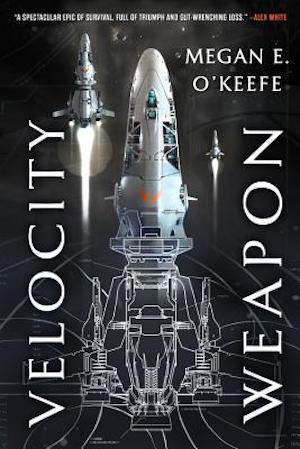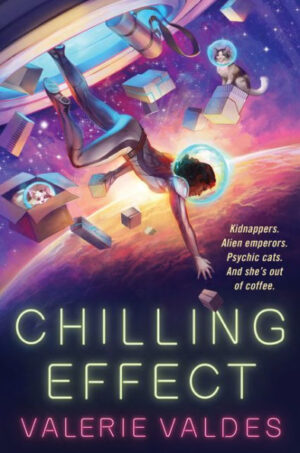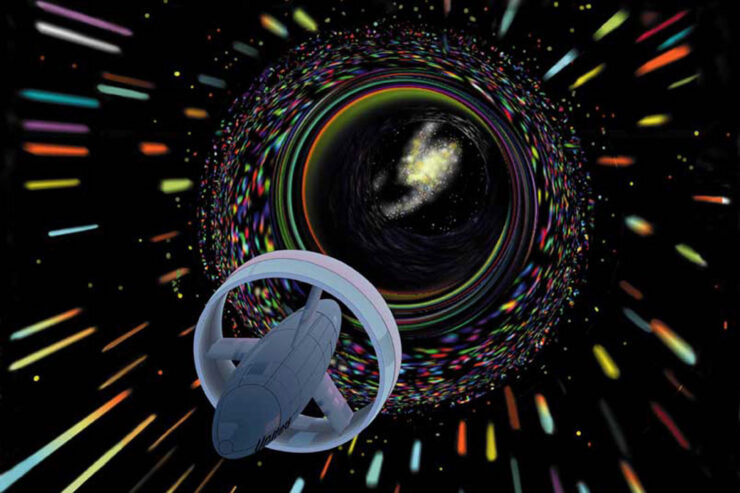As previously detailed, portal networks—transit systems offering access to discrete destinations rather than to any point along the transit line—have many advantages for SF authors. Buzzwords like “wormhole” are acceptably fashionable, enough to avoid the angry letters that old-timey FTL handwaves like time-negation or space-denial drives might inspire. Portal networks allow the author to sidestep what might be narratively irrelevant longueurs between origin and destination. Transportation bottlenecks facilitate plot. It is no surprise that portal networks have a long history in science fiction, or that their popularity continues.
Herewith, five recent works about portal networks.
The Praxis by Walter Jon Williams (20021)

Naturally occurring wormholes span vast interstellar distances. The Shaa saw an opportunity and energetically sought out and incorporated every other intelligent species into a vast empire, guided by the Shaa way of life, the Praxis. Naysayers might claim the Shaa “brutally conquered” the other civilizations and that the Shaa Praxis is inflexible authoritarianism…if such iconoclasm were not grounds for execution.
After ten thousand years of stability, a crisis looms. Over millennia, the Shaa have become rare. Now only one Shaa remains, itself on the brink of death. How will the Shaa empire be ruled, if the rulers are gone? The only sensible way to resolve the question is with a brutal civil war. Calamity for civilization but a career opportunity for officers Gareth Martinez and Caroline Sula…if they can survive.
This series felt in some ways like a reimagining of Williams’ venerable Drake Maijstral series, but brought into line with modern sensibilities. Comic elements were replaced by grand space battles and merciless political contention. People who prefer comedy to MilSF have only themselves to blame for not buying the earlier series in sufficient quantity. The MilSF fans, in contrast, know what they like, thus the many sequels to this work.
Velocity Weapon by Megan E. O’Keefe (2019)

Prime’s Keepers construct and maintain the Casimir network that provides humanity with access to the stars. All the Keepers ask in return is tariffs (Keepers say reasonable, payers say extortionate) on the goods shipped from system to system. Worlds dependent on trade have no choice but to submit to this system. All worlds, that is, save Icarion.
Icarion is a single world in a backwater system, denied access to the greater galaxy because they refuse to pay the tariffs. A local crisis, in other words. Unable to duplicate the gates, Icarion has enjoyed considerable success in other fields—as the Keepers discover when allied forces are annihilated by a WMD of unknown type. What other surprises await galactic civilization?
The Keepers provide an example of something else more common in SF than real life. The Keepers have managed to monopolize gate manufacture for thirteen centuries without a single princess smuggling the secrets out in her lavish headdress. Offhand I cannot think of a real-world monopoly that lasted so long. Feel free to remind me of the ones I’ve overlooked.
Chilling Effect by Valerie Valdes (2019)

Gates managed by the Benevolent Organization of Federated Astrostates connect member species across the galaxy. Humans are the latest addition to the group. A backward civilization, humans are valued by BOFA for two characteristics: humans are notoriously promiscuous and conveniently expendable.
Galactic criminal organization the Fridge would like to synergize their greed with Captain Eva Innocente’s manifest expendability. Thus, they offer Eva a very fair deal: if Eva and her ship will undertake a series of dangerous and illegal missions during which Eva and crew may well perish, the Fridge will spare Eva’s sister a grim fate. Eva sees no reasonable alternative but to agree. Her faithful crew might disagree, which is why Eva is not going to tell her crew about the deal.
This novel is also a good choice for a piece on errors that management should avoid. In this case, it’s spinning a series of lies certain to be revealed to people on whose services and friendships one depends. The price of delay is to increase the magnitude of displeasure when the staff discover what was withheld from them.
These Alien Skies by C.T. Rwizi (2021)

The only way to reach other star systems is via artificial Einstein-Rosen Bridges. The bridge traversed by the African Union Space Command starship is brand new. Logically, the system in which
Msizi and crew just arrived can have no prior visitors. How, then, is the system already occupied, and what has this to do with the fact the AUSC gate just exploded?
Forced to undertake an unexpected planetfall, Msizi and company are surrounded by strangers. This would be the perfect moment for the ship’s diplomatic staff to take charge, adroitly managing contact between two cultures. Alas, since there was every reason to expect the system to be uninhabited, the ship carried no diplomats. Contact falls to Msizi.
“These Alien Skies” offers a modern take on classic SF ideas, which makes me that much more annoyed with myself that I’ve yet to track down the author’s Scarlet Odyssey series in the year and a half since I read this story.
Furious Heaven by Kate Elliott (2022)

Promoted by tragedy into a senior administrative role, bold leader Sun finally has the opportunity to pursue her preferred military policy towards the Phene empire. The empire has more people and wealth than Sun’s native Republic of Chaonia. Some might advise caution. Sun embraces audacity.
Among the unexpected methods deployed against an increasingly astounded Phene, Sun rejects total reliance on the beacon network that links systems. Instead, she turns to knnu-drive ships. Beacons are instant whereas knnu drives are slow… but knnu drives can reach systems not directly connected by beacons, a detail Sun plans to exploit to confound her many enemies.
One of Sun’s most valuable assets is that her character is based on Alexander the Great, which greatly increases the odds that her courageous gambits will succeed rather than ending in ignominious disaster2. The drawback from Sun’s perspective is that Alexander’s career was glorious but short. The series being unfinished, it is not clear if Elliott intends for Sun to suffer the same fate as Alexander.
Of course, this is a small sample of a very large field. I didn’t even mention the obvious Iain M. Banks novel3. Feel free to regale me in comments with the post-2000 titles you feel I should have mentioned.
- I will address the question of whether 2002, now more than a fifth of a century ago, counts as “recent” as soon as I throttle my internal rage and denial. ↩︎
- Nobody ever bases SF on the least successful warlord to attack Persia. In fact, I am not even sure who that was. ↩︎
- I didn’t even mention the title in this footnote, despite having the room to do so. ↩︎










